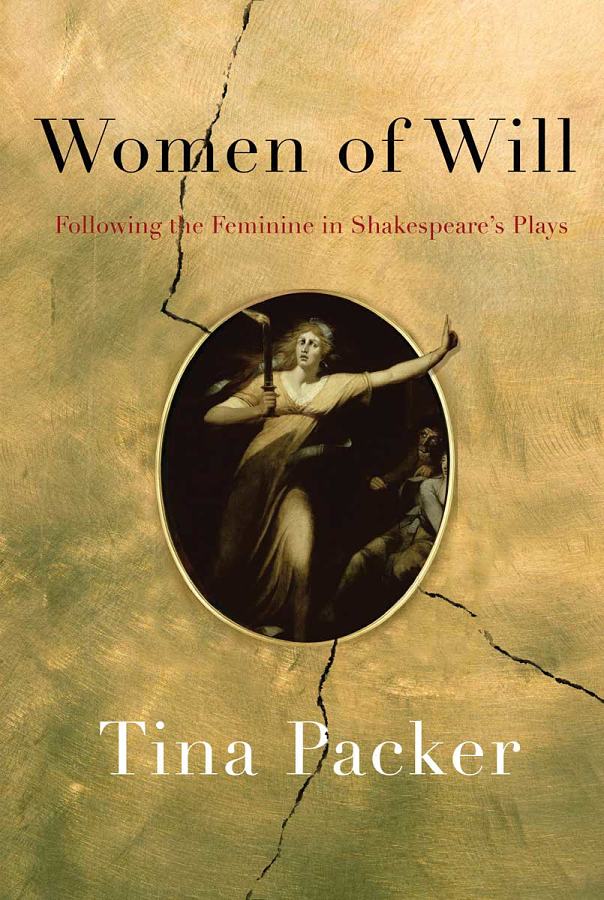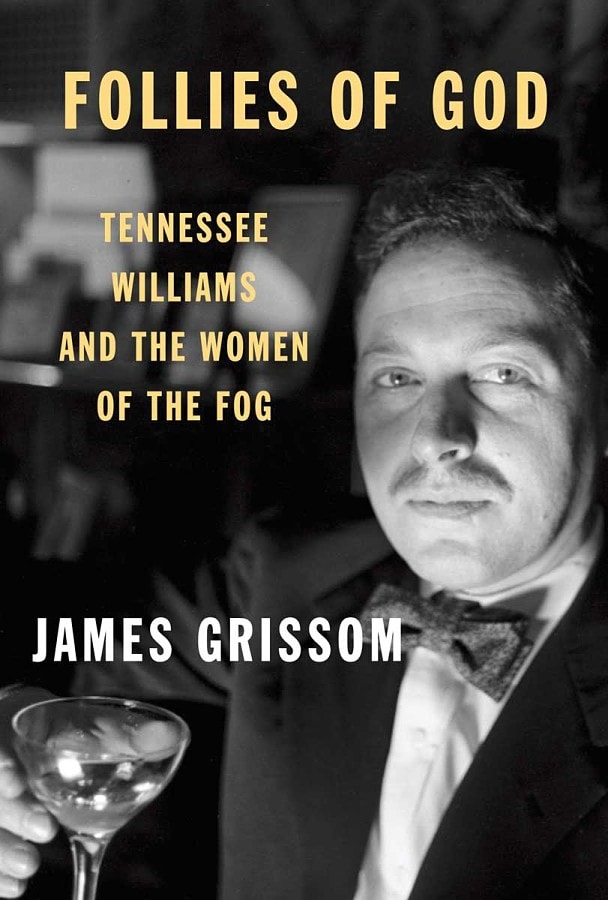Neither William Shakespeare nor Tennessee Williams lacks for in-print commentary, but two intriguing new books manage all the same to provide fresh insights into these all-too-familiar playwrights. Both books focus on the role of women in the playwrights’ lives and work, but they are otherwise strikingly different.
 In Women of Will: Following the Feminine in Shakespeare’s Plays, Tina Packer makes a passionate personal statement about what she’s learned from 40 years’ experience acting and directing Shakespeare. Meanwhile, James Grissom channels a multitude of other people’s voices in Follies of God: Tennessee Williams and the Women of the Fog, an odd but compelling record of Williams’s feelings about his most significant influences—and theirs about him.
In Women of Will: Following the Feminine in Shakespeare’s Plays, Tina Packer makes a passionate personal statement about what she’s learned from 40 years’ experience acting and directing Shakespeare. Meanwhile, James Grissom channels a multitude of other people’s voices in Follies of God: Tennessee Williams and the Women of the Fog, an odd but compelling record of Williams’s feelings about his most significant influences—and theirs about him.
A companion volume to the stage production of the same title in which Packer has toured for several years, Women of Will analyzes the changing nature of Shakespeare’s female characters as markers of his artistic and spiritual evolution. Dividing this evolution into five acts, Packer sees a sea change after Act 1, when Shakespeare went from stereotyping women as virgins or viragos (The Comedy of Errors and The Taming of the Shrew) “to groping his way toward…understanding them completely.” In Packer’s Act 2, men and women are equals in love (Romeo and Juliet, Much Ado About Nothing) but not equals in the world, which prompts the truth-tellers of Act 3 to offer a female perspective on male-dominated narratives. As Packer bluntly summarizes, “If they stay in their frocks [Desdemona and Emilia in Othello, Gertrude and Ophelia in Hamlet], they are killed or kill themselves. If they disguise themselves as men [Rosalind in As You Like It, Viola in Twelfth Night], others respond to their ideas and influence.”
This is all slightly schematic, and Packer’s commitment to her thesis sometimes leads her to simplify the evidence. It may well be that Shakespeare’s new empathy for women resulted from falling in love with the Dark Lady addressed in his sonnets—quick-witted, mercurial, and unabashedly sexual, like his best heroines—but the poem sequence also chronicles a love affair with a man and contains expressions of bitter sexual disgust. Packer ignores these elements; a bisexual, occasionally misogynistic Shakespeare doesn’t fit her format.
She’s on stronger ground in her detailed consideration of individual characters, particularly the brilliant explications of Lady Macbeth, Goneril and Regan in King Lear, and Coriolanus’s mother Volumnia—women as power-hungry and amoral as any man. Packer’s Act 4 contains the darkest plays in the Shakespearean canon, and she contends persuasively that one reason they are so dark is the absence of such “feminine” qualities as mercy or forgiveness—though she’s careful to tag the gender assignment of these qualities as “cultural rather than biological.”
Many scholars date Shakespeare’s retirement to Stratford around 1610, following completion of the late romances, but Packer’s conviction that he left London earlier, after writing Timon of Athens, makes emotional and artistic sense. He could only imagine an alternative to the brutal, nihilistic world depicted in the later tragedies, she argues, by literally getting out of town and embracing a more mythic, deliberately nonrealistic style. In what she calls his Act 5, plays such as A Winter’s Tale and The Tempest depict “daughters [who] redeem their father’s mistakes” and love triumphing over rage.
Some readers may detect a creeping political correctness in Packer’s vision of Shakespeare’s women as “the teachers and leaders in a new way of thinking about relationships, hierarchies and love,” and it’s awkward that his greatest female character, Cleopatra, can’t really be contained within this framework. But Packer never claims to offer the only truth about Shakespeare’s plays, simply to have discovered an important, neglected theme: that women’s voices are essential in his quest to reveal life in its essence and its entirety. Her warmhearted book will engage anyone who shares her belief that plays written 500 years ago can help us see how to live fully and happily in the 21st century.
 Follies of God, by contrast, depicts a self-destructive lifestyle few would wish to emulate. In 1982, responding to a letter seeking his advice about writing, Tennessee Williams invited Baton Rouge college student James Grissom to visit him in New Orleans. Grissom’s description of their meetings, over several days that September, shows Williams repairing frequently to hotel and restaurant bathrooms for the ingestion of various drugs; his musings on his career and collaborators veer from sharp insights to the embarrassing ramblings of an intoxicated old man.
Follies of God, by contrast, depicts a self-destructive lifestyle few would wish to emulate. In 1982, responding to a letter seeking his advice about writing, Tennessee Williams invited Baton Rouge college student James Grissom to visit him in New Orleans. Grissom’s description of their meetings, over several days that September, shows Williams repairing frequently to hotel and restaurant bathrooms for the ingestion of various drugs; his musings on his career and collaborators veer from sharp insights to the embarrassing ramblings of an intoxicated old man.
Typical of the latter is Williams’s murky explanation of “the follies of God” that gives Grissom’s book its title; similarly somber is the peculiar image of a female form emerging from the fog that in bygone days heralded the inception of a new play.
“I have not seen the fog in years,” Williams told Grissom in one of their phone conversations. Only someone desperately aware of his fading inspiration and stature would have enlisted a kid he’d just met in the bizarre mission Grissom delineates. At their first face-to-face encounter, Williams dictated a list of names, mostly female. “I would like for you to ask these people if I ever mattered,” he said (a sad remark from the author of The Glass Menagerie and A Streetcar Named Desire). “Can’t I get a single witness to whom I once delivered pages and deliverance to say that I once mattered?”
Some of the listees, like Maureen Stapleton and Jessica Tandy, were close friends and/or key interpreters of Williams’s work; others, such as Eva Le Gallienne and Mildred Natwick, had never performed in his plays and occasionally seem bemused at being contacted by a young man they’d never heard of bearing gifts and accolades from someone who had been dead for several years.
It is only in the book’s final pages that Grissom reveals he didn’t begin this quest until 1989, six years after Williams died, so readers may be just as bemused by the way he interweaves the playwright’s monologues in New Orleans and postmortem interviews with the subjects of those monologues, accompanied in most cases by substantial material on their personal backgrounds and professional accomplishments.
Still, from this mishmash emerges a heartbreakingly human portrait of Williams—narcissistic, needy, extravagantly emotional and vulnerable—and a fascinating look at the fragile, contingent and interactive nature of the creative process. (It’s clear from the comments of Williams and many others, for example, that he never again wrote as well as he did when his scripts were being directed and ruthlessly edited by Elia Kazan.) His partners in that process come across with equal vividness in snapshots that range from charming to stomach-churning: Marlon Brando’s affectionate chaffing of Stapleton for “her extraordinary ability to find and secrete food on her person,” on the one hand; on the other, the distasteful image of Jo Van Fleet eating at a Manhattan diner, clad only in a mink coat “she made no effort to keep…around her nude, aged body.”
John Lahr’s superb recent biography, Tennessee Williams: Mad Pilgrimage of the Flesh, offers a far more structured and objective assessment of Williams’s achievements, but it’s valuably supplemented by Grissom’s meandering amalgam of anecdotes, thumbnail biographies and gossip about and among a plethora of gifted, albeit often troubled, people. Follies of God reminds us that art, like life, is often messy.
New York City–based arts reporter Wendy Smith writes frequently for this magazine.

